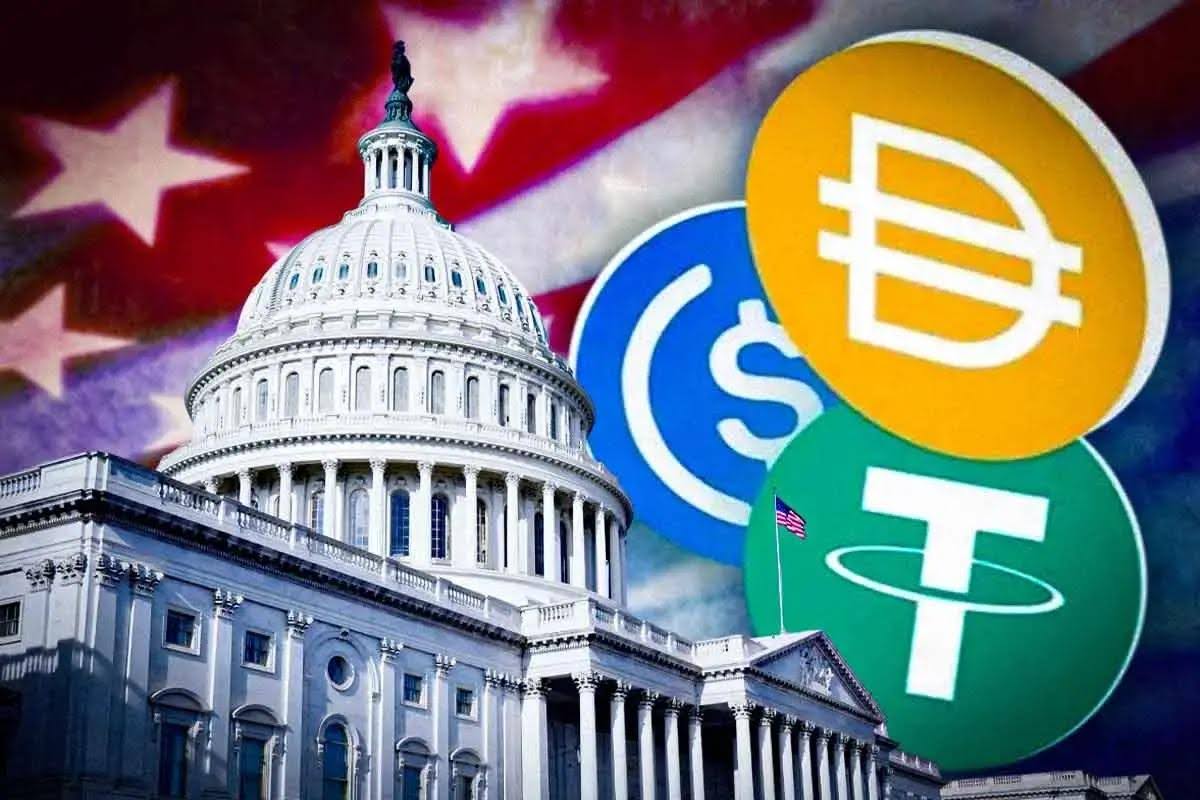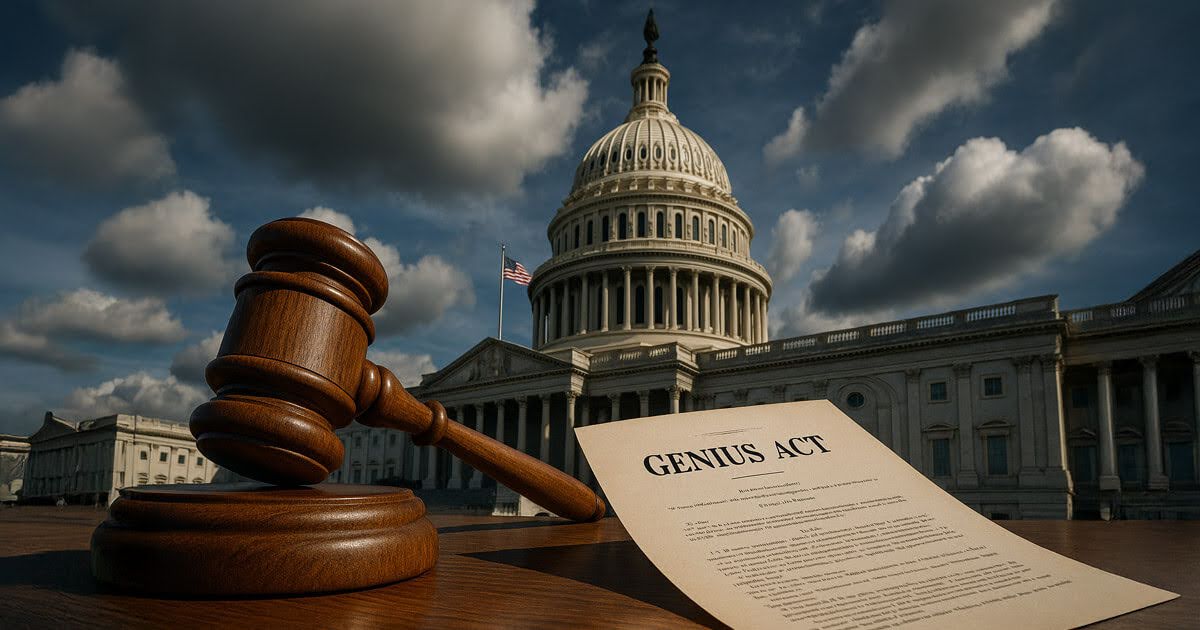House Receives GENIUS Act After 68–30 Senate Vote — But Crypto Reform Now Faces a New Twist
Key Takeaways:
- The GENIUS Act, a key U.S. stablecoin bill, has officially reached the House after strong Senate approval.
- House leadership signals possible delay as lawmakers seek to merge it with the broader CLARITY Act.
- Donald Trump urges a clean passage of the GENIUS Act, putting pressure on the House to avoid amendments.
After clearing the Senate with overwhelming bipartisan support, the GENIUS Act — a landmark bill aimed at regulating stablecoins — has entered the House. But momentum could stall as top Republicans call for a merger with the CLARITY Act, a more comprehensive crypto market structure proposal.
Read More: GENIUS Act 2025 – All You Need to Know About This New Stablecoin Regulation

From Senate Approval to House Reception
Swift Movement, But an Uncertain Path Forward
The GENIUS Act was approved 68-30 in the United States Senate on June 17, 2025, showing cross-party agreement on the importance of regulation of stablecoins. The draft, which has been largely considered as a legislative blueprint for digital asset policy, now progresses to the House of Representatives.
Timeline of Legislative Actions:
- June 17, 2025 (Senate): The GENIUS Act passed with amendments, vote No. 318.
- June 23, 2025, 3:19 PM (House): The House received the bill in open session.
- June 23, 2025, 3:29 PM (House): The bill was “held at the desk,” which is leadership’s way of saying it has not been referred to committee or floor debate.
- June 23, 2025 (Senate): A message on Senate action sent to the House.
This process indicates administrative efficiency — only 10 minutes separated the bill’s receipt and its pause — but also reflects an internal hold while House leadership considers its next move.
Read More: U.S. Senate Passes the GENIUS Act — What’s Really Inside the $3.7 Trillion Crypto Bill?
House Push to Merge GENIUS with CLARITY Act
Merger Tensions Could Derail Fast Progress
According to journalist Eleanor Terrett on X, some lawmakers — led by GOP Majority Whip Tom Emmer — are advocating for a merger between the GENIUS Act and the CLARITY Act, a broader crypto market structure bill. The CLARITY Act, while not yet passed, outlines a legal framework for classifying crypto assets and assigning regulatory authority between the SEC and CFTC.
Emmer’s statement:
“Market structure is essential to any Congressional action on digital assets. I expect the GENIUS Act has a path in the HOUSE, so long as it’s accompanied by the CLARITY Act.”
Merging the two could delay the GENIUS Act significantly, as it would require the Senate to approve a modified version — triggering a legislative ping-pong that could stretch into Q4 2025 or beyond.

Trump Calls for Immediate Passage
Former President Donald Trump has weighed in, calling for the GENIUS Act to be passed without changes. His team released a statement urging the House to avoid amendments, emphasizing the urgency of implementing a stablecoin framework to boost U.S. competitiveness in digital finance.
This political pressure from Trump adds a layer of urgency, especially as both parties position themselves on crypto policy ahead of the 2026 midterm cycle. The message is clear: Get the bill to the President “ASAP.”
The CLARITY Act: Broader Crypto Rules in Waiting
The CLARITY Act, often referred to as the crypto industry’s long-awaited regulatory backbone, seeks to define digital assets as either commodities or securities — ending years of regulatory ambiguity. While the House version has cleared preliminary markups, its path to final passage is still murky.
Recently, the Senate Banking Subcommittee on Digital Assets revealed a separate set of principles for its own version of CLARITY, suggesting further divergence between chambers.
Should GENIUS be tied to CLARITY, the two bills could be held up in extended negotiations, so it’s not as likely that stablecoin rules would be enacted in 2025.
Crypto Market Reacts to Potential Delay
Market observers are paying keen attention to how this political gridlock might affect U.S. stablecoin suppliers such as Circle (USDC), Paxos, and Tether (USDT). And while these businesses function under state-issued guidelines now, a federal standard would provide some long-term certainty.
Industry analysts warn:
- A delay in stablecoin regulation could weaken U.S. competitiveness against jurisdictions like the EU, where MiCA rules are already being implemented.
- Unregulated growth of offshore stablecoins may continue to sidestep U.S. consumer protection goals.
What’s Next?
As of now, the GENIUS Act sits “held at the desk” in the House. The coming days will reveal whether House leadership prioritizes a clean vote — or gambles on a broader crypto overhaul.
With Senate approval already secured and presidential pressure mounting, the House stands at a crossroads: act quickly and send GENIUS to the White House — or link it to a wider crypto battle that could cost critical momentum.
The post House Receives GENIUS Act After 68–30 Senate Vote — But Crypto Reform Now Faces a New Twist appeared first on CryptoNinjas.
CryptoNinjas




















